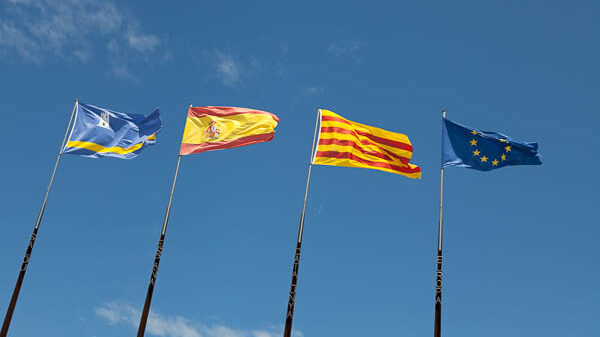Staff writer Fred Taylor interviews three prominent figures in the debate over the future of Catalonia. The ex-President of Catalonia and current leaders of pro- and anti-independence organisations speak exclusively with Roar News about Catalan separatism and the future of the Spanish state.
1 October 2017 is a date engraved into the mind of every Catalan. On this day millions of people across the region in Spain went to cast their vote in an illegal referendum on independence. They were met with fists and batons; crowds of police officers attempted to seize ballot boxes and block voters from reaching the polling stations. The images which infused international media for the following days included those of old women bleeding, a man who had lost his eye due to rubber bullets and thousands of people on the streets demanding an end to what they deemed ‘Spanish rule’.
In the following days, separatists rejoiced at the results of this referendum, with more than 90% of those voting being in favour of Catalonia’s separation from Spain. Although this result was on a low turnout of just over 40%, this did not stop the Catalan Parliament from declaring independence.
This notwithstanding, a new state was never created. The then-President of Catalonia, Carles Puigdemont, decided to suspend the declaration of independence in order to engage in talks with the Spanish government. Spain rejected this table of negotiation, and instead arrested Catalan leaders, alleging that they had committed sedition and malfeasance, having used public money to fund a referendum that aimed. In the words of the Constitutional Court, this was an attempt to undermine “the indissoluble unity of the Spanish nation”.
Yet since then the Catalan independence movement has fallen out of the forefront of the mainstream media. Many have been left wondering what exactly is happening in Catalonia and what the future holds for the aspirations of separatists and loyalists. Roar staff writer Fred Taylor spoke with three prominent figures from separatist and anti-separatist camps in order to find out.
Dolors Feliu
I first decided to interview Dolors Feliu, the president of one of the leading pro-independence organisations, the Catalan National Assembly (ANC). This group was created in 2011 with the objective of founding the Catalan Republic, and, to this date, it is not willing to settle for anything less. The organisation properly rose to fame after organising a Catalan national day pro-independence rally in 2012, which was attended by 600,000 people in Barcelona according to El País. Ms Feliu is an ex-lawyer who, in lieu of retirement, has dedicated herself to fighting for the sovereignty of Catalonia.
I started off by showing her the results of the some recent polling which gave anti-separatism a twelve point lead over separatism. I explained that numbers of protestors attending demonstrations was slowly decreasing and that the international press show less and less interest in the issue, indicating an ailing movement. She did not, however, agree with this view of independence as in decline.
She initially suggested that the reasons for the movement being in a sudden contraction were due to more alarming issues like food and fuel prices taking precedence in the immediate, and told me that the latest polling showed that a spike in favour of independence was beginning to occur – albeit one of only 3 points. She also pointed out that separatist parties won a majority of votes for the first time ever in the last regional election, a great moment of strength for the movement. While Covid-19 and the cost-of-living crisis may have distracted media attention, she is optimistic about the movement’s future.
I asked her why a Catalan should be a separatist, considering the historical, cultural and economic ties with Spain. She responded decisively: “The argument that is the strongest is that the Catalan people must be able to decide everything by itself: how it spends its money, what its rights are, how culture is managed… without Spain telling them what to do”. A simple, compelling argument; a message understandable by all. Yet, I ask her, why has it not been achieved? She tells me of the ‘Spanish state’, portraying an ominous figure which continuously crushes the dreams of the Catalan people.
Catalonia has had a majority in favour of independence in the past, and has continuously had one in favour of more sovereignty for the last twenty years, but the Spanish Constitution outlaws independence. To change this, a three-fifths super-majority of Parliament is needed – an almost unachievable proposition. Therefore, as Feliu points out, there has been no offer of ‘devo-max’ to the Catalan people, such as there was in Scotland.
This legal inability, for her, has been compounded by political unwillingness. Since Pedro Sánchez became the Spanish Prime Minister in 2018, there have been negotiations between the Spanish and Catalan governments. These have been condemned by some anti-separatist groups. But these negotiations are also attacked by Feliu: “the way this government has behaved… has not been in any way in accordance with the fundamental rights of self-determination of the Catalan people”, she said. The Spanish state should go further and offer more than just the olive branch of dialogue.
Despite these words, I ask her to consider the steps the Spanish government has made: pardoning jailed Catalan leaders, an agreement allowing schooling to be overwhelmingly in Catalan, and the reform of the Spanish penal code, putting it more in line with the rest of Europe. I suggest that Catalans should value a government willing to listen and lend a hand instead of one which would turn its back on any talks.
This clearly isn’t the first time she’s had to deal with this line of argument. Her organisation stands upon the idea of necessary unilateral action, as the Spanish state would never allow a referendum, which is the only solution which they would ever support. She says that “for a long time, this idea has been used. ‘Let’s vote for the Socialists [the incumbent government], because the Popular Party [unwilling to negotiate with Catalan separatists] will do worse’. However, this just makes everything the same for a very long time, and slowly leads to a worsening situation.”
She argues that the government’s positive actions toward Catalonia are just the result of international pressure, “the pardoning of the separatist leaders was only done after a resolution was published by the Council of Europe which said that they were political prisoners, and that they could not be kept in prison.”
She quickly pivots to her next idea and her organisation’s main proposal: independence by the end of the year. “In the second semester of 2023, the Spanish State will have the presidency of the European Commission, so they will have the eyes of Europe on them, and will feel more pressure not to violate rights in the eyes of Europe. We need to be focussed on independence, and not look at other issues.” Her organisation proposes that the Catalan government declare independence during this period of heightened scrutiny.
However, after the last referendum, all EU countries announced that they recognised what occurred in Spain as an internal issue, to be dealt with entirely by the Spanish authorities, and offered no support to the Catalan government.
She rejects the idea that this will reoccur. “In 2017, what was missing was an internal recognition. The Catalan state declared independence, but there was no change of flags, no effort to maintain independence… Unilateral declarations are not contrary to international law, as long as they are done democratically and without the intervention of third states… So we must proclaim independence, and do it. Independence is composed of a people with a link to a land, who have a de facto control of the land. We need to get control of the territory, and then demand international recognition: to Spain, the EU and the rest of the world.”
However, this vision is not even shared by fellow separatist groups. Most have rejected this notion of independence by the end of the year. It is seen as unrealistic and overly ambitious, maybe even a case of repeating past blunders by hurrying toward a goal without any clear or precise plans of how to get there, or what exactly you are reaching. A referendum will not be achieved by legal means, a Spanish government spokesperson confirmed in very direct words last month: “It is unconstitutional and will not be held”. The ANC’s proposal is simply a second illegal attempt – but with a Catalan government who has denied upcoming unilateral action, independence by the end of the year does not seem to be grounded in reality.
To finish off the interview, I ask her where she sees Catalonia in five years. “I think that Catalonia will be independent, it is a lot closer than we think. In a very short time, we will see the fruits of this fight.” Dolors Feliu offers a robust defence of a position that most on both sides believe untenable. One thing is apparent, however – there is clear ambition and will to “make independence happen”, a slogan which was repeated at least 10 times during our short discussion.
Elda Mata
Next I sought out the other side, by interviewing Elda Mata, president of the Societat Civil Catalana (SCC), a leading anti-independence organisation. SCC was founded in 2014 and is composed of members all across the political spectrum. The organisation’s objectives include defending the rule of law and individual rights, and to promote the links Catalonia has with the rest of Spain.
I initially question her on the point raised by Feliu, the 52% majority won by separatists at the last election. But she assigns this little importance. The election had low turnout, she remarks, suggesting that anti-separatists tend to see regional elections as less important. They therefore don’t turn out in equal vigour as their separatist counterparts. In her opinion, a regional election is a poor sample to gauge popular opinion.
She accuses Catalan nationalists of destroying Catalonia. She defines a nationalist as “somebody, or a group of people, or a party that bases everything on identity, and usually on identity in a very exclusive way. Nationalists are always thinking that they are better than the rest.” She then, fairly shockingly, makes an equivalency between Catalan nationalism and Nazism, another form of nationalism: “Another point of nationalist ideology is that it excludes. It needs a scapegoat, in this case Spain. They usually sell the idea that ‘we are victims of’: ‘We are victims of the Jews’, ‘we are victims of the Spanish government’.”
Ni los nazis ni los ultranacionalistas separatistas conseguirán callarnos.
Defensem la libertat d'opinar diferent. pic.twitter.com/lKErgBWRsG— Societat Civil Catalana (@Societatcc) April 22, 2016
Comparing your political foe to the Nazis in anyway is almost unheard of in the UK, but is more common in Spain. Last year, an MP from the third largest party in Spain, Vox, called Prime Minister Pedro Sánchez “Fürher” in the Spanish Parliament, and compared one of his ministers to Joseph Goebbels. While this partly shows the heightened tensions within Catalan politics, it also serves a reminder that less than fifty years ago Spain itself was a fascist dictatorship – the idea of fascism is far more present in their rhetoric.
I interject, claiming that surely such language does not aid her cause, rubbing salt into the wounds of a divided Catalan society. I contend that many separatists are not exclusionary and simply want protection for their culture, language and autonomy. She admits the existence of these moderate nationalists, but highlights that the nationalist government does not share these concerns. In her opinion the Catalan government, under the control of nationalists, has hijacked issues such as the protection of the Catalan language into an attack on the Spanish language, as shown by a rejection from the Catalan government to teach just 25% of lessons in Spanish. She asserts that this is the modus operandi of nationalism, excluding and demonising one group and using them as a scape-goat for a whole range of problems: “they are using language not as a communication tool but as a war tool to keep us in this way.”
“The Generalitat will only respect Catalan culture if it is written in Catalan. There is music written by Spaniards from Catalonia. Some of our most renowned write in Spanish, but they are Catalans if they live in Catalonia or were born in Catalonia. So, what is the idea of closing in on only Catalan and forgetting the rest.” She explains that she wants to live in a place where people are proud about their Catalan culture, but can also feel strongly Spanish. She has a poster behind her of a ‘casteller’, a Catalan tradition where people build human towers, holding a Spanish flag. “I like diversity as an enrichment for everybody. I am absolutely against the idea of superiority in one over the other.”

One rather prominent feature of the SCC is that it does not believe in any ‘appeasement’ of separatists. It states that negotiating with the Catalan government pushes the conflict in the wrong direction. This is because “nationalism, per se, cannot be appeased”. She says that the Spanish government has already done a lot to appease nationalists, all to its own demise, and to the aid of the separatist movement.
She argues that Spain is already one of the most decentralised countries in the world and underlines that the main reason you cannot negotiate with separatists is because there is no shared basis on which one can negotiate upon. She takes an example from poker to defend her argument: “If you decide we are both playing cards and it is a 4 card game, and you say right I am going to play with 5, but the rules are 4, we cannot compromise with 4 and a half because that would be changing the rules, and to change the rule of poker, it’s not just you and me sitting together, it involves the rest of the country.”
I ask her about the more practical concern of how to manage a region of a country where “a massive number of people on that side want there to be 5 cards and not four”. She says that the key to resolving this conflict is respect, and that we should remember that “who suffers and who is really dealing with everything is the basic, plain citizen, whom is often not considered as priority for politicians”. She argues that separatists must respect the constitution, and that if laws are going to be changed, it must occur according to the constitution. Yet changing the Spanish constitution is a near-impossible task. This essentially leaves the separatist movement with the sole option of abandoning their pursuit of legal change.
I ask her where she sees Catalonia five years from now. She, unsurprisingly, predicts a negative future, highlighting the fact that many companies fled Catalonia after the political instability of the 2017 referendum. She believes that multinational companies will continue to eschew Barcelona as a place to conduct business. She ends with a dystopian vision: “the President of the Government of Catalonia is giving all this indoctrination through schools, through mass media etc. He’s got to keep the bike going so that they continue to be in power. Same people keep burning the money, it is basically corruption.”
Artur Mas
From the two extremes of the spectrum, we see completely different points of view to the conflict, and two different predictions. On one hand, there is an imperative for ‘a people’ to determine their own future; on the other, a need for a country to follow its democratically approved constitution. One extreme needs a rapid dash toward independence; the other sees continuing this long unity as essential. One sees the celebration of Catalan culture and language; the other, the demonisation of its Spanish counterparts.
To resolve these positions, I sought a non-partisan expert. This was the ex-President of Catalonia, Artur Mas,. Mas was President from 2010-2016, and made the issue of Catalan independence the most prominent one in Catalonia when he adopted it into his party’s manifesto and campaigned for it in the 2012 election.
We started our discussion with talk of the constitution. I initially asked him whether he had voted for the constitution (that currently blocks Catalonia from holding an independence referendum), when a national referendum was held on it after Franco died in 1978. Mas affirmed that he had voted in favour of the constitution, as did 95% of Catalans.
At the time, people were happy with Spain, especially after it joined the European Economic Community (now the EU) and the Euro. Yet at the start of the century, the tides started to turn. Two decades since the constitution’s ratification, we had reached the culmination of decentralisation, he tells me. The Popular Party (PP), a centre-right Spanish patriot party, gained an absolute majority in Madrid, and the direction of change was towards recentralisation. The turning point for him was in 2006, when Catalans voted for more powers in a referendum by three-quarters, but the Spanish courts rejected the move. He “understood that if we followed the same path we had followed for decades, there was not a good solution ahead of us.” He then went on to call an election in 2012 and ran for the first time with a campaign that supported independence.
I ask him if he now regrets having done this, given that the movement has dominated Catalan politics for the last 10 years, yet brought no victory in terms of autonomy. He says no, “I don’t regret it because I think that we did what we had to do.” However, he admits mistakes were made, that they underestimated the reaction of the Spanish state and that they should have not demanded such a strict rate of change. But he compares this to the alternative: “to do again what we did for decades, in the sense that we can try to gain a little bit of autonomy, try to take advantage of the political situations in Madrid, when the Spanish central government needs the support of other political parties in the Parliament and then deal with that situation and gain some positives for Catalonia.” He says that this is not a long term solution, repeatedly plastering a wound when surgery is needed. He makes that a legal referendum is the only long term solution, admitting that a vote could go either way.
I point out that a Madrid-approved referendum is not on the cards in the foreseeable future, and he agrees. I ask him what is needed for Spain to have to concede to a referendum due to insurmountable international pressure. A substantial amount more of the population coming out in clear support, he replies. He notes that this is possible, as the movement went from 15% to 50% support in just ten years. However, he concedes that “we are not enough to convey a clear message in the sense that there is an absolute legitimacy for the claim of Catalan independence.”
I finish the interview by asking him, like the others, where he sees Catalonia in five years time. “I do not think that the situation can change very much”, he replies, “from the political point of view, there is not going to be a referendum, and the only big question ahead of us is whether the percentage of 50% in favour will increase. I do not know.” He remarks that if the Catalan separatists lose their majority in the next parliamentary election, then “this is the end, because this decision would be taken by the Catalan people, we talk about Catalan elections… If they decide that the decision is to change the majorities in the Parliament, and for pro-independence political parties to lose their majority, then the game is over, but because of domestic mistakes.”
Conclusion
In this last exchange, it is obvious that the interviewee is unimpeded by membership of a party or organisation. Artur Mas has long since left the world of politics. Despite being the leader of the movement for an extensive period, he now sits on the sidelines now like everybody else. He seems resigned, having had to accept that independence is unlikely, that a recognised referendum will probably never occur.
The reality of the Catalan independence movement is that “there is not going to be a referendum” – the only question is whether the movement can increase its support to insurmountable levels. But with organisations such as Feliu’s ANC not focussing on building consensus, and with polling currently showing that the independence parties would likely lose such a vote, such a considered path towards independence appears futile. The hardline approach to a referendum presented by the Spanish government seems to have worked. Despite Elda Mata’s apocalyptic predictions for Catalonia’s future, it is likely that the place will be as Spanish as flamenco for the foreseeable future.


















